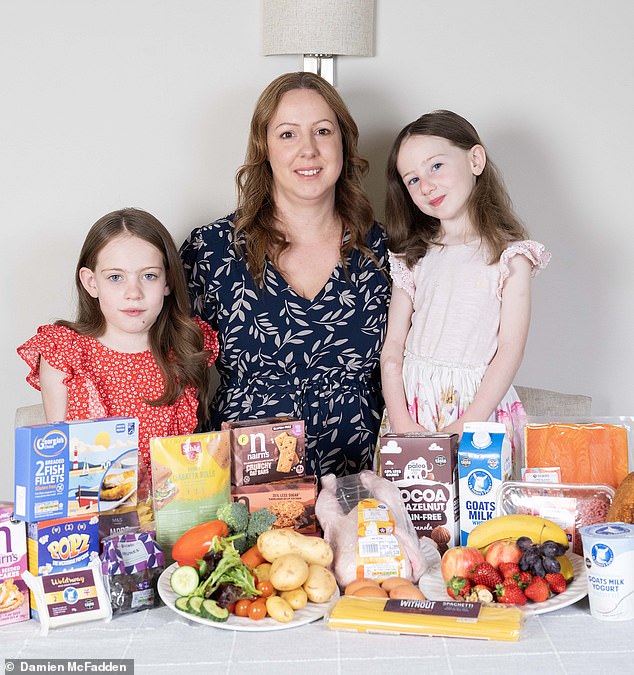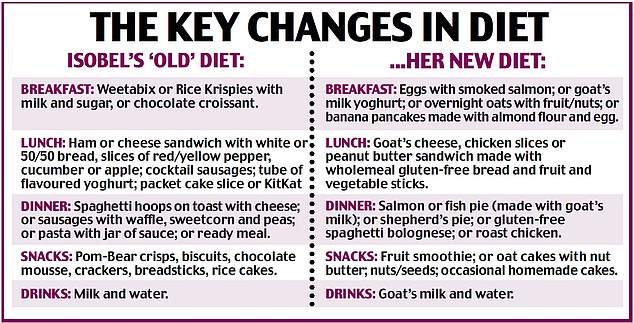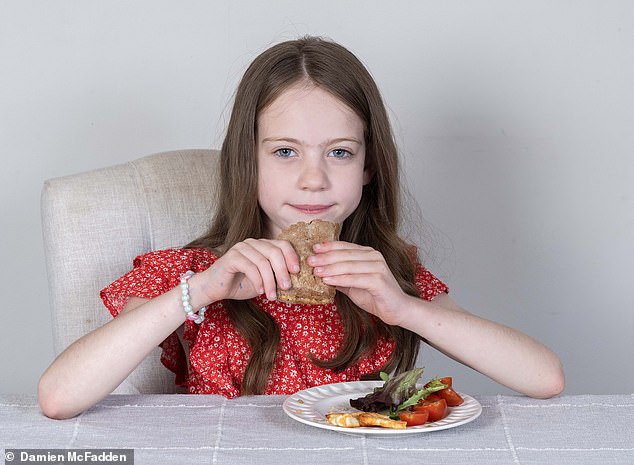For the previous three years, peace has been in brief provide for Kate and Mike Rawlings because the behaviour of their older youngster has spiralled uncontrolled.
Isobel, now eight, would normally flip meal occasions at their Northampton residence right into a battlefield, repeatedly getting up and down from the desk and shouting at Kate, 42, a dietitian, and Mike, 43, a gross sales supervisor.
Easy requests to return to the desk may end in unprompted bursts of rage that always descended into screaming meltdowns, the place Isobel would storm out of the room, slamming doorways and every now and then lashing out at her sister, Sophie, 4. ‘Isobel’s behaviour had change into progressively worse over the previous two or three years and life was changing into exhausting and really irritating,’ says Kate.

Kate Rawlings along with her daughters Isobel, eight, and Sophie, 4. The desk has a group of the meals that make up Isobel’s new eating regimen, together with goat’s milk and gluten-free merchandise
‘At first we thought she might need been copying naughty youngsters at her college, after which we puzzled if she was performing out of jealousy for her sister.’
However then, in April, Kate learn one thing on social media which stopped her in her tracks.
TV health coach Joe Wicks had speculated in a radio interview that the sugary junk meals he’d eaten as a baby may have been straight linked to his former unruly and sometimes naughty behaviour.
His feedback had been seen as controversial by some and went viral on social media.
Joe needed to challenge a clarification that poor eating regimen alone can’t trigger problems comparable to ADHD (consideration deficit hyperactivity dysfunction, which may run in households and might result in seemingly ‘naughty’ behaviour). However he mentioned: ‘I do imagine meals has a large impression, whether or not you might have ADHD or not. I feel it actually impacts our temper and our potential to take a seat and focus, and even our vitality and our psychological well being.’
Studying this made Kate marvel if eating regimen could possibly be affecting Isobel’s behaviour, too. ‘Her uncontrolled bursts of anger had been occurring increasingly incessantly, and we had been all on tenterhooks making an attempt to keep away from triggering an explosion and never figuring out what to do when she kicked off,’ she says.
‘Isobel appeared to carry issues collectively at college however her mood would explode when she bought residence. It wasn’t simply meal occasions — she would take any alternative to choose a combat with Sophie, after which go utterly loopy if she couldn’t get her personal approach, screaming and slamming doorways.’
Bedtimes too had been a giant downside and simply getting Isobel up and prepared for college every morning offered one other space of battle. ‘The one solution to tempt her to eat breakfast was with a croissant in entrance of the TV,’ says Kate.
As a professional dietitian working with troubled adults in a psychological well being unit, she admits to being embarrassed {that a} doable meals connection hadn’t beforehand occurred to her. She says: ‘When household life is so annoying, you’ll do something to maintain the peace, and though I used to be looking for time to cook dinner household meals from scratch, extremely processed merchandise — sauces, prepared meals and snacks — had been creeping into the weekly buying basket.’
So may Isobel’s explosive mood tantrums actually be rooted in her eating regimen?
‘Increasingly analysis is uncovering hyperlinks between poor behaviour and eating regimen in youngsters — and that’s not simply all the way down to sugar — however because of a number of different parts within the eating regimen from components to the kind of cooking oil used,’ says Dr Alex Richardson, a dietary neuroscientist and visiting analysis fellow at Bournemouth College, who’s a specialist at investigating the hyperlinks between meals and behavior. To check how a lot of an impression eating regimen can have, Good Well being organised a mini trial.
Dr Richardson despatched Kate the Strengths and Difficulties questionnaire to fill in about Isobel’s behaviour. It’s utilized in scientific research to evaluate emotional and behavioural difficulties in youngsters. She then analysed the outcomes.
This evaluation put Isobel within the prime 10 per cent of kids for emotional issues, and within the prime 5 per cent for hyperactivity and difficulties with ‘conduct’. Her delinquent behaviour rating was on the high quality.
Good Well being then requested Dr Richardson, who can also be director of the impartial charity Meals and Behaviour Analysis, to analyse the household eating regimen and recommend modifications based mostly on scientific proof that may hopefully enhance Isobel’s behaviour.
For 3 weeks, your entire household adhered to Dr Richardson’s urged meal plans and stored a each day diary for Isobel to see what impression it had. The outcomes got here as shock to everybody concerned.
SUGAR SABOTEUR
‘Of all of the dietary modifications you can also make to attempt to enhance a baby’s behaviour, lowering sugar will often have probably the most speedy — if not probably the most vital — impression,’ says Dr Richardson.
‘And my first commentary on seeing Isobel’s meals diary was the variety of sugary meals she eats.’ Dr Richardson estimated Isobel was consuming greater than 40g of sugar per day, which is almost double the NHS-recommended restrict of 24g for youngsters aged seven to 10.
She says: ‘Anybody — grownup or youngster — who begins their day with extremely processed candy stuff, comparable to cereal or croissants, units themselves up for a curler coaster of blood sugar peaks and troughs which make impulse management and focus troublesome. Research present added sugar impairs the effectivity of mitochondria [tiny structures inside our cells] which energy each cell of our physique and mind.’

Isobel’s outdated eating regimen was made up of a excessive variety of sweetened meals and it was estimated she was consuming greater than 40g of sugar a day
Research (together with one revealed within the Journal of Affective Problems in 2019) have proven that high-sugar, high-fat diets can enhance the danger of ADHD in youngsters (characterised by hyperactivity, impulsiveness and inattention), whereas diets wealthy in greens and fruit seem to guard in opposition to all these behaviour.
Analysis by Yale College revealed within the Journal of Pediatrics in 1995 discovered that sugary drinks triggered an increase in ranges of the hormone adrenaline in youngsters, which has individually been proven to result in aggressiveness, restlessness and focus difficulties.
THE SOLUTION: Dr Richardson suggested Kate to take away or conceal all sugary snacks, and embody protein in every meal to make sure Isobel felt full and had much less urge to snack between meals. ‘Treats’ comparable to low-sugar, oat-based biscuits could possibly be provided not more than as soon as a day, and extremely processed white bread, muffins, crisps, candy yoghurts and biscuits had been off the desk.
LACK OF NUTRIENTS
Issues have been expressed that the majority youngsters’s diets within the UK include round two-thirds ultra-processed meals (UPFs), that are industrially produced with typically prolonged lists of synthetic components. However Dr Richardson estimates that Isobel’s eating regimen was nearer to 80 per cent UPF.
‘Even a do-it-yourself sandwich counts as a UPF if it’s made with shop-bought white sliced bread and processed ham,’ she argues.
Dr Richardson warns {that a} eating regimen excessive in UPFs will include quite a lot of synthetic components and this might go away a baby poor in important vitamins comparable to iron and zinc, that are identified to be necessary for temper and behavior — and deficiencies have been linked with ADHD-like behaviours and different behavioural issues.
‘An early examine discovered one sort of synthetic colouring decreased ranges of zinc in youngsters with ADHD, however not in youngsters within the management group,’ she says.
‘Different proof suggests some youngsters could also be significantly delicate to synthetic components.’
Two research by researchers on the College of Surrey (one in 1990, the opposite in 1997) discovered that some synthetic colors (particularly a yellow meals dye referred to as tartrazine) enhance ADHD signs and cut back zinc ranges in youngsters with ADHD, leaving youngsters with out ADHD unaffected. In the meantime, synthetic sweeteners might upset the stability of the intestine microbiome (micro organism and different microbes identified to play an element in sending indicators from the intestine to the mind that assist to control temper).
Equally, some emulsifiers added to processed meals to enhance texture or lengthen shelf-life at the moment are thought to disturb the fragile stability of intestine micro organism.
What’s extra, a eating regimen excessive in UPFs tends to be low in fibre (as processing strips away fibre) — and whereas youngsters of Isobel’s age ought to eat about 15g of fibre per day, Dr Richardson says she was consuming lower than 5g a day.

Low-fibre meals (whether or not savoury or candy) is extra swiftly digested and transformed into sugar within the blood, probably resulting in temper swings — plus fibre is necessary for sustaining the intestine microbiome. ‘We now know the way necessary a wholesome intestine microbiome is for psychological and bodily wellbeing, and the way it can not thrive on a low-fibre, ultra-processed eating regimen,’ says Dr Richardson.
THE SOLUTION: Kate was suggested to take away all UPFs from Isobel’s eating regimen, to modify to cooking meals from scratch, and to extend her consumption of fruit, greens, nuts and wholegrains to extend her fibre consumption.
TOO MUCH ‘TOXIC’ OIL
Processed meals are often made utilizing seed oils (comparable to sunflower oil or soybean oil), which analysis now suggests can immediate inflammatory modifications within the physique and which can affect behaviour.
Dr Richardson says: ‘Each time youngsters eat crisps, biscuits or muffins they’re filling themselves with what are basically poisonous fat,’ explaining that extremely processed fat are thought to make mind cell partitions much less versatile, impacting communication between them and in flip affecting temper.
THE SOLUTION: Kate was urged to scale back Isobel’s consumption of fried meals, change from utilizing vegetable oils to olive oil or butter and including extra oily fish (salmon, sardines, mackerel) wealthy in omega-3 fatty acids to her eating regimen.
Dr Richardson says a each day complement could also be advisable if a baby is unwilling to eat oily fish.
She additionally notes that it may take as much as three months for modifications in dietary fat to impression Isobel’s behaviour, ‘as a result of the mind is the final organ to get better when it has been poor for a while’.
TOO MUCH DAIRY?
Isobel loves milk, bread and pasta, however ‘there’s a chance that she could possibly be delicate to the particular proteins in cow’s milk and gluten which could possibly be affecting her behaviour’, says Dr Richardson. ‘It is a controversial hyperlink — which has solely been reported anecdotally and thru animal research — however generally it’s value experimenting with goat’s milk and gluten-free bread and pasta to see if it helps.
‘There’s a number of analysis making an attempt to pin down the mechanisms at play, however once we digest gluten or a protein in cow’s milk referred to as casein we produce protein fragments referred to as peptides which activate the identical receptors within the physique and mind as opioid medication,’ she says.
‘Whereas most individuals don’t appear to have issues with this, the speculation is that these “opioid peptides” make gluten and milk merchandise appear extremely addictive to some delicate people — sufficient to set off disruptive behaviour or temper swings, and so robust cravings for these meals.’
THE SOLUTION: Dr Richardson predicted that if Isobel was delicate to those peptides, then swapping cow’s milk for goat’s and quickly eradicating gluten from her eating regimen would possibly immediate worse behaviour initially as her system reacted to withdrawal, however that her behaviour would possibly then change into extra settled.
THE RESULTS
After three weeks of following Dr Richardson’s suggestions, Kate stuffed within the Strengths and Difficulties questionnaire once more. Dr Richardson analysed the outcomes.
She says: ‘After I in contrast the outcomes from the primary behaviour questionnaire and the second, even I used to be surprised by the outcomes. All of the scores had dropped into the class of “common” for a kid of her age.
‘It’s fairly exceptional to attain this alteration in behaviour in such a brief house of time, as it may well take as much as three months for a dietary change to impression behaviour.
‘However this provides assist to the rising proof that meals and behavior are inextricably linked — and a few youngsters are extra delicate to the results than others.
‘All of us profit from consuming higher, however the analysis reveals that those that profit probably the most are these having difficulties with temper, behaviour, sleep or the flexibility to study.’
She provides: ‘Easy dietary modifications actually can have a robust impression, and so they present a secure and efficient solution to complement different approaches to troublesome behaviours — in each youngsters and adults.’
FAMILY’S VERDICT
Kate says: ‘At first, it appeared like quite a lot of effort for no achieve. Isobel resolutely refused to eat the in a single day oats and pancakes I made for breakfast with out a great deal of sugar or chocolate unfold — she stored asking for her traditional breakfast croissant. The nuts I put in her lunch field got here again intact however with the salt licked off.

Isobel’s behaviour was discovered to have improved after three weeks of following the brand new eating regimen
‘And for the primary week, though Isobel advised me she was actually eager to seek out out if new meals made her “much less offended” — her behaviour remained volcanic. The truth is, one significantly violent door-banging outburst resulted in a glass panel being smashed.
‘However within the second week I began making ready mini breakfast omelettes with crimson pepper every night for a grab-and-go breakfast and the ladies reluctantly began to just accept popcorn as a substitute of crisps and low-sugar oat biscuits [2g of sugar per biscuit compared to 5g for a chocolate digestive] as an occasional deal with.
‘And regardless of by no means having eaten fish, Isobel slowly got here round to the thought of fish fingers [in a gluten-free crumb].
‘Throughout the second week there was at the very least one episode the place Isobel shouted and refused to adjust to easy requests or grabbed her sister to make her cry, however there have been indicators of nicer behaviour, too.
‘On the finish of that second week Isobel was awarded “star of the week” for working onerous at college — that’s by no means occurred earlier than!
‘And after a go to to my dad and mom’ home, my mom spontaneously commented on how “beautiful” Isobel had been. I used to be amazed.
‘Within the third week I observed Isobel was extra settled on the eating desk and wasn’t badgering me a lot for sugary snacks. I had bought so used to her waking up in a foul temper that I used to be caught abruptly when she willingly brushed her enamel one morning, and he or she even tidied away her toys on the first time of asking.
‘This needed to be linked to what she’s been consuming.
‘It’s been a tricky three weeks, however I’m satisfied these dietary modifications did result in enhancements in her behaviour.
‘It’s been time-consuming, annoying, and my meals store is marginally dearer, however it’s been worthwhile. Isobel is delighted the “experiment” has ended and retains asking once we can return to McDonald’s — however I’m hopeful we will sustain with a few of the modifications.’
- information.fabresearch.org/ fab-for-parents
Names have been modified


